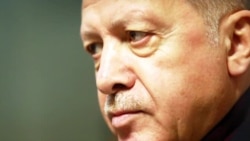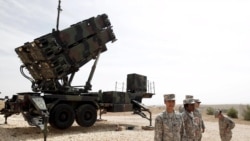World leaders gathered in Brussels on June 14 for the 2021 summit of the North Atlantic Treaty Organization (NATO), with an agenda of standing together against global security threats.
The summit included a 45-minute meeting between U.S. President Joe Biden and Turkish President Recep Tayyip Erdogan, who discussed Syria, Afghanistan and Turkey’s S-400 missile deal with Russia.
Although Biden told reporters the meeting with Erdogan had been “very good,” relations between the two countries have frayed in the past few years, in large part because of the Russia missile defense deal.
Turkey justified its purchase of the Russian S-400 air defense system by claiming that Washington had blocked it from getting the U.S. Patriot missile defense system. In 2019, after Turkey purchased the S-400 system, the United States also removed it from the F-35 joint strike fighter jet program.
"Although Turkey has fulfilled promises regarding F-35s, unfortunately, the U.S. has not fulfilled promises,” the state-run Anadolu news agency quoted Erdogan as saying on the eve of the NATO summit. “[The U.S.] did not keep its promise on the Patriot system, either.’’
But that characterization is misleading. The haggling between Washington and Ankara over the F-35s and the Patriot missile defense system has been complex, and early on Erdogan also played footsie with the Chinese.
Turkey joined NATO in 1952, several years after the end of the Second World War. Turkey considers the alliance a linchpin of Euro-Atlantic ties and kept watch over NATO’s southern flank during the Cold War. NATO guaranteed Turkey’s security as an alliance member.
Turkey has NATO’s second-largest land-based army after the U.S.
The U.S. Patriot is a sophisticated, ground-to-air guided-missile defense system. It was designed during the Cold War but played a key role in stopping SCUD missile strikes from Iraq during the 1991 Gulf War. Since then, Turkey has sought NATO’s agreement to deploy the Patriot system on its soil during periods of turmoil in the region.
The outbreak of the conflict in Syria in 2011 prompted Turkey ask NATO for Patriots to protect its borders and, in 2013, NATO launched a mission to augment Turkey’s air defenses forces by installing the Patriot system.
“This system is plugged into NATO's air defense network and contributes to protect the Turkish population and territory.” NATO said in a statement.
However, due to the high cost and long-term maintenance of the Patriot system, NATO offered Turkey an alternative defense system in 2015. This did not appeal to Turkey, which sought to build up its defense industry and insisted on transferring the Patriot so Turkey could manufacture the missile defense system itself.
Turkey’s ambition to secure missile defense self-sufficiency led it to announce in 2013 that it would purchase a long-range air and anti-missile system from China. However, under pressure from NATO, Turkey scrapped the deal in 2015, and claimed that it did so because of China’s reluctance to transfer operational and technical knowledge of the system.
Turkish public broadcaster TRT World reported in December 2020 that Turkey’s security concerns were exacerbated by the U.S. withdrawal of a Patriot system from the Turkish-Syrian border in 2015, adding that Russia’s S-400 missile defense system was more reliable. All these factors led Turkey to pursue purchasing the S-400 from Russia.
U.S. support for the Kurdish-led Syrian Democratic Forces (YPG) in the fight against the Islamic State terror group in Syria weakened Turkey’s trust in the United States. Turkey considers the YPG a terrorist group affiliated with the Kurdistan’s Workers Party (PKK). The U.S. has designated the PKK a terrorist organization but said if found no links between the PKK and the YPG.
In November 2017, Ankara announced that it reached a deal with Moscow to buy the S-400 long-range air and anti-missile defense system to be installed on Turkish soil. In December 2018, the U.S. approved $3.5 billion sale of Patriots to Turkey, but Ankara decided to stick with the purchase of Russian S-400s.
Turkey’s deal with Russia includes joint production and technology transfer to Turkey – a long-term goal sought by the Turkish government. But the U.S. said Turkey’s acquisition of the S-400 posed a security threat to the F-35 fighter jet program, given that the S-400 system could be used to gather sensitive information that could end up in Russia’s hands.
The Turkish-Russian deal also raised NATO’s concerns about the influence of Russia, which NATO considers an adversary, over Turkey.
Pentagon and NATO officials warned Turkey from plugging the S-400 into NATO systems, including integrating it with the U.S F-35 jets, which could lead to data leaks and security breaches.
In 2019, Turkey received its first S-400 battery from Russia and broke off talks with the U.S. to obtain the Patriot missile system. In February, the Pentagon warned Turkey not to take possession of a second S-400 battery.
“We urge Turkey not to move ahead with the delivery of the S-400. We believe it's incompatible with the F-35,” Pentagon Press Secretary John F. Kirby told reporters in a February 23 briefing. “They had multiple opportunities over the last decade to purchase the Patriot defense system from the United States, and instead chose this S-400, which provides Russia revenue, access, and influence.”
Turkey had planned to buy 100 F-35 fighters from the U.S. and manufacture spare F-35 parts locally.
Turkey was also sanctioned under the Countering America’s Adversaries Through Sanctions Act (CAATSA), which the U.S. Congress passed in 2017. That law allows sanctions against any country that deals with the Russian defense sector. The sanctions on Turkey include a ban on U.S. export licenses for the Turkish government agency that handles military purchases and exports, visa restrictions and asset freeze on several Turkish officials.
Turkey has been playing a problematic role in NATO, from refusing to sign off on a 2019 NATO defense plan for Poland, Lithuania, Latvia and Estonia, following Russia’s annexation of Crimea in 2014, to calling on NATO members to declare the Syrian Kurdish YPG as a terrorist organization. In 2018, Turkey dropped its demands that NATO members label the YPG as a terrorist organization after they refused to do so.
Amberin Zaman, a journalist for the Middle East news site Al-Monitor, wrote in a piece published on May 28 that Turkey had lobbied to water down the language in NATO’s statements condemning Russia following the Russian cyberattacks against U.S. government agencies in April.
Reuters reported that in May, Turkey also worked to softn NATO’s language in denouncing Belarusian authorities for forcing a Ryanair flight to land at Minsk airport, which enabled them to arrest dissident Belarusian journalist Raman Protasevich.







